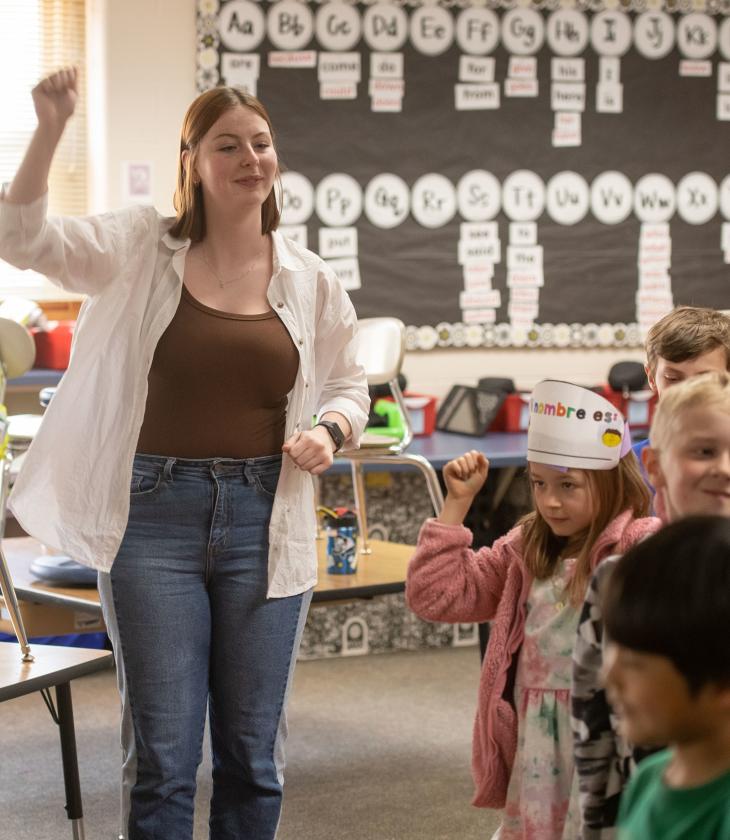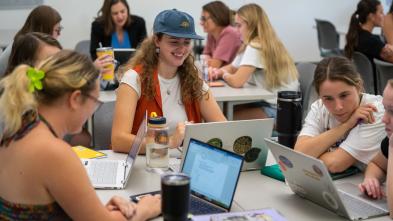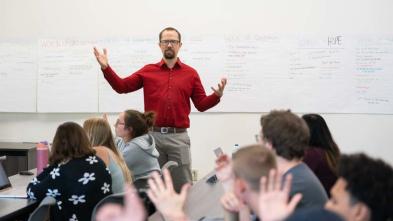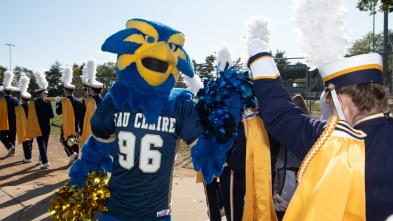

Special Education, Unified Special Education K-12 and Elementary / Middle K-9, Online, Teaching (SETT: Transition to Teaching Pathway)
This pathway is a route for nontraditional undergraduate and other adult learners to complete a preparation program and become practicing teachers in Wisconsin.
Earn a Degree in Education
Transition to Teaching is a pathway to completing UW-Eau Claire’s unified elementary and middle special education program. This is a route for nontraditional undergraduate and other adult learners to complete a preparation program and become practicing teachers in Wisconsin. The end result of this pathway is a bachelor's degree and eligibility for licensure in both 4k-12 Special Education and 4k-9 Elementary/Middle Education.
Adult learners with several years of experience as paraprofessionals/educational assistants or otherwise employed in school settings are excellent candidates for this pathway. Approximately 30 credits of general education/liberal arts coursework or an associate’s degree or bachelor’s degree is needed to be eligible for this pathway. Other adults who want to make a career change and who meet these credit requirements are also good candidates.
This pathway is offered in an accelerated format online and can be completed within two years plus student teaching. There are several ways to complete student teaching, such as on the job as an intern or as the teacher of record with a License with Stipulations.
Program Details
Licensure Information
Completion of teacher preparation programs at UW-Eau Claire meets licensure requirements in Wisconsin. Our programs may not meet requirements in other states. It is very important that individuals seeking licensure in another state obtain the most recent certification/licensure information directly from the state in which they seek employment. Find contact information on each state licensure office here.
Licensure requirements can change at any time. UW-Eau Claire’s Teacher Education Program Office ensures that our programs meet the requirements for licensure in Wisconsin. If you seek licensure in another state, be aware that their requirements could change at any time.
The United States Department of Education requires institutions to disclose information for programs leading to professional certification or licensure concerning whether each program meets state educational requirements for initial licensure or certification. Please note:
- Obtaining a Wisconsin Teaching License PRIOR to applying for a teaching license in another state is usually helpful and strongly recommended.
- "Meets requirements" means that a student is eligible for a license with stipulations, typically for 1-3 years, in that state. The stipulations are likely to be specific testing requirements and/or competency through a course or examination. In some instances, additional stipulations might be added.
- Licensure grade levels vary from state to state. Students who are eligible for a specific grade range in Wisconsin may be licensed for a narrower grade range in another state. Each state determines grade ranges for licensing differently.
- State licensure requirements may change at any time. Licensure questions should be referred to the Teacher Education Program Office (tep@uwec.edu).
Students in this program are eligible for two licenses (K-12 Special Education and K-9 General Education)
General Education K-9
The requirements of this program meet the requirements in the following states and territories:
Alabama, Arizona, Arkansas, California, Colorado, Connecticut, Florida, Hawaii, Idaho, Illinois, Indiana, Iowa, Louisiana, Maine, Michigan, Minnesota, Mississippi, Missouri, Nevada, North Carolina, North Dakota, Oklahoma, Oregon, Rhode Island, South Carolina, Texas, Utah, Vermont, Virginia, West Virginia, Wisconsin, Wyoming, American Samoa
The requirements of this program do not meet requirements in the following states or territories:
Alaska, Delaware, Georgia, Kansas, Kentucky, Maryland, Massachusetts, Montana, Nebraska, New Hampshire, New Jersey, New Mexico, New York, Ohio, Pennsylvania, South Dakota, Tennessee, Washington, Washington D. C., Guam, Northern Mariana Islands, Puerto Rico, U.S. Virgin Islands
Cross-Categorical K-12
The requirements of this program meet the requirements in the following states and territories:
Alabama, Arizona, Arkansas, California, Colorado, Florida, Hawaii, Idaho, Illinois, Indiana, Iowa, Louisiana, Maine, Michigan, Minnesota, Mississippi, Missouri, Nevada, North Carolina, North Dakota, Oklahoma, Oregon, Rhode Island, South Carolina, Texas, Utah, Vermont, Virginia, West Virginia, Wisconsin, Wyoming, American Samoa
The requirements of this program do not meet the requirements in the following states and territories:
Alaska, Connecticut, Delaware, Georgia, Kansas, Kentucky, Maryland, Massachusetts, Montana, Nebraska, New Hampshire, New Jersey, New Mexico, New York, Ohio, Pennsylvania, South Dakota, Tennessee, Washington, Washington D. C., Guam, Northern Mariana Islands, Puerto Rico, U.S. Virgin Islands
Blugold Stories
JustThe Facts
Courses cover a variety of topics, including communication development, disabilities, assessment, and sensory pedagogy.
Here are a few courses in Special Education, Unified Special Education K-12 and Elementary / Middle K-9, Online, Teaching (SETT: Transition to Teaching Pathway) at UW-Eau Claire.
SEIP 306
Applied Behavior Analysis for Teachers
This course will introduce the student to models, methods, and materials for managing the classroom behavioral problems of children with exceptional needs. The course will focus on the acquisition and development of skills which will permit teachers to: (a) manage behaviors that are counterproductive to learning in the classroom, (b) teach prosocial interpersonal behaviors that facilitate successful functioning in schools and society, and (c) structure the classroom environment so that both academic and social interpersonal behaviors produce appropriate consequences for children.
SEIP 402
Collaboration for Student Success
This course will provide students with the knowledge and skills related to collaboration skills with parents, teachers, agencies and other school personnel that impact students with disabilities. Parent and family relations, conflict resolution, co-teaching practices, Special Education law and ethical behavior will also be presented.
SEIP 331
Special Education Policies, Procedures, and Planning
This course is designed for students to begin the process of writing and reviewing IEPs for students in special education. Specific IEP forms will be used to demonstrate the procedures while discussing variations in the overall process. As students develop an IEP, the importance of measurable goals and appropriate accommodations/ modifications will be discussed. In addition, topics related to legal procedures, data collection, and collaboration will be addressed.
Get More Info
Sign up to receive additional information about our campus.
Meet the Faculty














